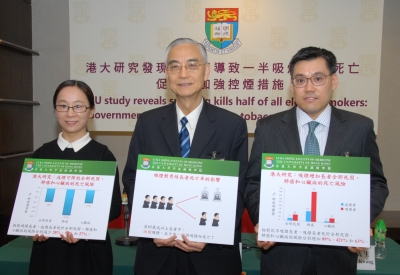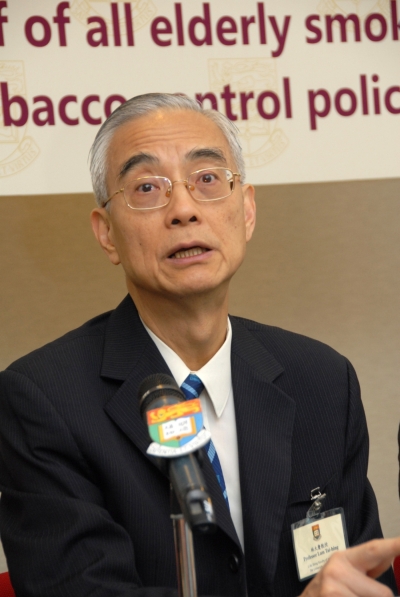HKU study reveals smoking kills half of all elderly smokers: Government should strengthen tobacco control policies
The School of Public Health of The University of Hong Kong, Li Ka Shing Faculty of Medicine (HKU) and the Department of Health conducted a 11-year follow-up study based on the data from 18 Elderly Health Centres (EHCs) and found that, among elderly smokers aged 65 or above, at least one out of two was killed by smoking; and among those 85 or above, at least one out of four was killed by smoking. The risks of lung cancer and cardiovascular disease (CVD) mortality were increased by more than 4 times (421%) and nearly doubled (63%) respectively, compared to those who never smoked. On the other hand, the risks of all-causes (deaths from any causes), lung cancer and CVD mortality in quitters were significantly reduced compared with smokers. The results clearly show that smoking cessation effectively reduced the risks of death. The study has been published in an International Journal Addiction recently.
Research implications
Professor Lam Tai-hing, Sir Robert Kotewall Professor in Public Health and Chair Professor of School of Public Health, Li Ka Shing Faculty of Medicine, HKU points out, ?At least one out of every 2 elderly smokers will be killed by smoking induced illnesses. The result is alarming and deserves our attention. On the other hand, if the elderly quit smoking, we found that their survival rate can be largely improved. That?s why we expect our government to strengthen the tobacco control policies, such as raising tobacco taxes, increasing smoking cessation services etc., to advocate smoking cessation among the elderly and improve their health.?
Research Methodology and findings
Based on the data gathered from 18 EHCs of Department of Health, a total of 65,510 elderly people aged 65 or above and first enrolled to the Centres during 1998 to 2001 were followed up. Information on smoking and other risk factors was collected by interviews, and death and causes of death were obtained from the Deaths Registries. The elderly were followed up for about 11 years on average, so as to find out the association of smoking, quitting and mortality.
Up to May 2012, among over 65,000 elderly subjects, 19,520 deaths (30%) were observed.
The results compared the risk of death between elderly smokers and non-smokers, as well as elderly former smokers and smokers. Details are as follows:
Risk of death compared between elderly smokers and elderly non-smokers:
All elderly subjects
All-causes: Increased 89%
Lung Cancer: Increased 421%
Cardiovascular Disease (CVD) : Increased 63%
Elderly aged 65-84
All-causes: Increased 93%
Lung Cancer: Increased 429%
Cardiovascular Disease (CVD) : Increased 64%
Elderly aged 85 or above
All-causes: Increased 29%
Lung Cancer: Increased 182%
Cardiovascular Disease (CVD) : Increased 38%
Risk of death compared between elderly former smokers and elderly smokers:
All elderly subjects
All-causes: Decreased 28%
Lung Cancer: Decreased 53%
Cardiovascular Disease (CVD): Decreased 27%
Elderly aged 65-84
All-causes: Decreased 28%
Lung Cancer: Decreased 54%
Cardiovascular Disease (CVD): Decreased 27%
Elderly aged 85 or above
All-causes: Decreased 5%
Lung Cancer: Decreased 5%
Cardiovascular Disease (CVD): Decreased 17%
Conclusions and suggestions
Among those elderly aged 65 or above, at least one out of two smokers died from smoking-induced diseases. As those who died from smoking-induced diseases at an age before 65 could not participate in the services at EHCs, the result is based on the group of elderly who were relatively healthy. Thus, we believe that if one starts smoking from a young age, the risk of death will be even higher, up to more than half. In our study, we found that smoking cessation can reduce risks of death from all-causes, lung cancer and cardiovascular disease even among the elderly. Hence, elderly smokers should quit smoking immediately to reduce mortality and improve survival.
Mr Antonio Kwong, Chairman of Hong Kong Council on Smoking and Health (COSH) called on different sectors of the society to encourage the elderly smokers to quit smoking. COSH has organised various education and publicity activities for the elderly to enrich their knowledge on tobacco hazards and to rectify the fallacy on smoking. Mr Antonio Kwong advocated the government to strengthen the tobacco control policies, including enhancement of smoking cessation services for the elderly and increasing tobacco tax to motivate the elderly to kick the habit and ultimately gain better health.
Research Team
This study was conducted jointly by the School of Public Health, Li Ka Shing Faculty of Medicine, HKU and the Department of Health. The team was led by Professor Lam Tai-hing, Sir Robert Kotewall Professor in Public Health and Chair Professor of the School of Public Health. Other researchers include: Dr Xu Lin, Post-doctoral Fellow, Dr CM Schooling, Associate Professor of the School of Public Health and Professor Gabriel M Leung, Chair Professor of School of Public Health and Dean of Li Ka Shing Faculty of Medicine, HKU and Dr WM Chan and Dr SY Lee from the Department of Health.












.png)
